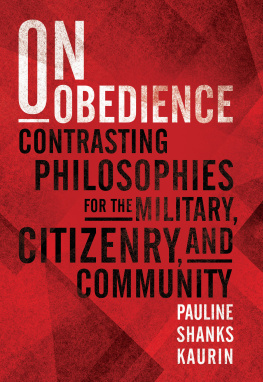
ON OBEDIENCE

ON OBEDIENCE

CONTRASTING PHILOSOPHIES FOR THE MILITARY, CITIZENRY, AND COMMUNITY
PAULINE SHANKS KAURIN
NAVAL INSTITUTE PRESS ANNAPOLIS, MARYLAND
Naval Institute Press
291 Wood Road
Annapolis, MD 21402
2020 by Pauline Shanks Kaurin
All rights reserved. No part of this book may be reproduced or utilized in any form or by any means, electronic or mechanical, including photocopying and recording, or by any information storage and retrieval system, without permission in writing from the publisher.
Library of Congress Cataloging-in-Publication Data
Names: Shanks Kaurin, Pauline, author.
Title: On obedience : contrasting philosophies for the military, citizenry, and community / Pauline Shanks Kaurin.
Identifiers: LCCN 2019040971 (print) | LCCN 2019040972 (ebook) | ISBN 9781682474914 (hardcover) | ISBN 9781682474921 (epub) | ISBN 9781682474921 (pdf)
Subjects: LCSH: Obedience.
Classification: LCC BJ1459 .S53 2020 (print) | LCC BJ1459 (ebook) | DDC 174/.9355dc23
LC record available at https://lccn.loc.gov/2019040971
LC ebook record available at https://lccn.loc.gov/2019040972
 Print editions meet the requirements of ANSI/NISO z39.481992
Print editions meet the requirements of ANSI/NISO z39.481992
(Permanence of Paper).
Printed in the United States of America.
28 27 26 25 24 23 22 21 209 8 7 6 5 4 3 2 1
First printing
CONTENTS
ACKNOWLEDGMENTS
THIS BOOK BEGAN AS A SERIES of questions and intellectual explorations in my blog linked on Twitter, but in the immediate aftermath of the 2016 election, I had numerous colleagues and acquaintances (especially in the military community) who expressed concern about whether they could or should render obedience to the new administration. In response to these questions, I wrote a specific blog post on the unique context that many were facing after the election. I tried to frame the issue, to raise questions and issues for people to consider, and to discuss the issue in terms of the profession of arms and the community of practice of the U.S. military and political context. This event and the responses to the blog convinced me that the posts that I had been working on needed to be a much deeper and more philosophically nuanced project and that it was needed sooner rather than later. While these issues of obedience are as old as Antigone and the Iliad, they have taken on an increased urgency in the past few years. It also became clear that we needed a conversation about not just the military and obedience, but also how obedience should be viewed in the political context. This book is the result of a desire to open and deepen that conversation.
I would like to first thank my followers on various social media platforms for their engagement and comments that sharpened the ideas. Some of the ideas in in 2017, and I thank those who attended that session and gave feedback.
Some of the material on disobedience and professional judgment and discretion was initially worked out in several articles published in The Strategy Bridge in 201718, and I thank the team there for their support, especially Nathan Finney, Ty May-field, and Eric Murphy.
Second, many of the ideas about professionalism and professional judgment and discretion were worked out in a project that ultimately became a volume on the nature of and challenges to the military profession, Redefining the Modern Military, published in 2018 by the Naval Institute Press. In particular, contributor Mike Denny, whose ideas about professionals being able to know when to break the rules, shares some of the points that I am making here, and thinking through his work on this was helpful in clarifying how my ideas are similar to and also depart from his. My ideas of military professionalism were also shaped by my contribution to that book and the process that led to it. Thank you to Nate Finney and Ty Mayfield for shepherding that project and supporting the conversation about professionalism, a discussion to which I hope this book will contribute.
Third, benefited from feedback from Dr. Samuel T. Shanks. Dr. Nikki Coleman was also kind enough to let me see a copy of her unpublished dissertation on obedience (soon to be published as a book by Routledge), and I benefited from conversations with her on the topic. When her work is published, it will fill in the legal aspects of this topic, which I intentionally did not address in this book as her work does a stellar job at that piece of the discussion.
In addition, I received support from Pacific Lutheran University, including sabbatical leave during 201819, for the completion of this manuscript. My colleagues in the Department of Philosophy were especially supportive of this project, and I thank them. The final work on this book was done at the start of my tenure at the U.S. Naval War College, and my colleagues there were very supportive. I also thank the editors, reviewers, and staff at Naval Institute Press for their hard work and willingness to support this project. I especially thank Dr. Benjamin Armstrong of the U.S. Naval Academy for his encouragement and for providing helpful connections to bring this project to publication.
Finally, my children McClellan and Trevan were an inspiration for the topic of obedience and even argued with me on several of the points in the book; without their love and patience, this book would not have been possible.
ON OBEDIENCE

CHAPTER 1

INTRODUCTION
If his cause be wrong, our obedience to the King wipes the crime of it out of us.
WILLIAM SHAKESPEARE, Henry V
Remember we are women / Im forced, I have no choiceI must obey.
SOPHOCLES, ANTIGONE
GOOD, WELL-BEHAVED CHILDREN ARE OBEDIENT. We take our dogs to training so they can learn to be obedient. We assume that our cats will not be obedientor at least not on command or consistently. Members of the military are expected to give obedience to their superiors and obey all lawful orders, and they in fact take oaths to that effect when they join the military. Citizens are obligated to be obedient to political authority, with rare and carefully delineated exceptions that are subject to legal discretion and rulings. In Sophocles play, Antigone might be viewed as prideful and arrogant for disobeying the orders of Creon not to bury her rebellious brother, and she was sentenced to death for the offense. When the police officer pulls me over for speeding, it is expected that I will obey and subject myself to the authority of the state, within reasonable and prescribed limits.
Civil disobedience is generally acknowledged to be disruptive and a threat to the established order, even if there are cases (such as antiwar protests or the U.S. civil rights movement in the 1950s and 1960s) where it is eventually deemed appropriate and necessary. However, at the time of these actions and movements, figures such as Martin Luther King Jr. were viewed as a threat to law and order and were accordingly targeted and arrested. Disobedience in legal and political contexts is generally discussed in pejorative terms and must be well justified to avoid or mitigate punishment. The character of Kurtz in Joseph Conrads Heart of Darkness
Next page












 Print editions meet the requirements of ANSI/NISO z39.481992
Print editions meet the requirements of ANSI/NISO z39.481992